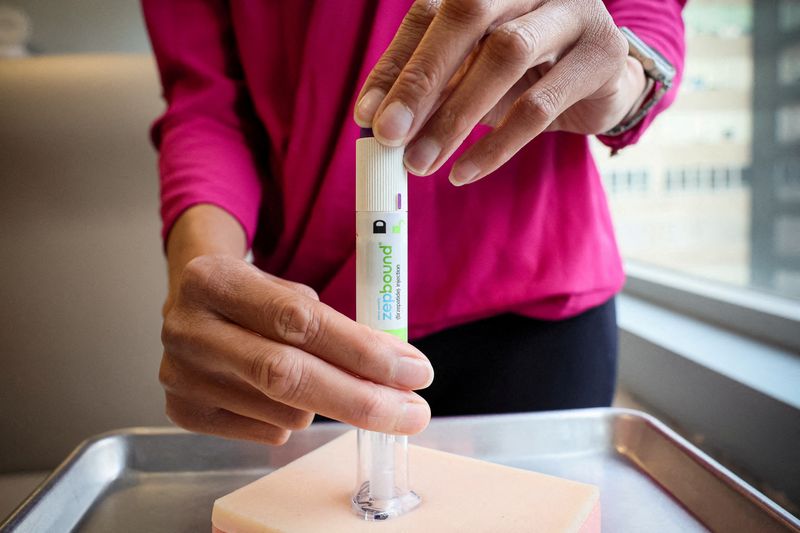By Patrick Wingrove and Bhanvi Satija
(Reuters) - Americans are still eagerly seeking prescriptions for Eli Lilly (NYSE:LLY) and Novo Nordisk (NYSE:NVO)'s weight-loss and diabetes drugs but cannot always fill them because of supply issues and insurance hurdles, according to their doctors.
Those frustrations, along with the medicines' high cost, are pushing patients to cheaper compounded versions sold online, doctors, pharmacy officials and Wall Street analysts said.
Lilly last week reported a rare $1.5 billion sales miss for its injectable obesity drug Zepbound and diabetes medicine Mounjaro combined, raising concerns among investors that demand might be cooling for the products. Those market dynamics will again be in focus when Novo reports results for its diabetes drug Ozempic and weight-loss medicine Wegovy this Wednesday.
Lilly attributed the shortfall to a logistical issue as it worked to overcome a shortage of its two drugs, which share the same active ingredient. Distributors were still working through new supplies purchased in the prior quarter rather than ordering more, Lilly said. The drugmaker kept a lid on advertising Zepbound in the meantime, which may have dampened demand temporarily, the company said.
In interviews with Reuters, eight U.S. obesity specialists at universities and large health systems described a different experience. All of them said they are still seeing intense demand for weight-loss medicines. Yet many of their patients cannot get health insurance coverage for the Lilly and Novo drugs, whose list prices top $1,000 per month.
Four of the doctors told Reuters that patients are also still finding it hard to get various doses at times and are shopping around pharmacies to find supply.
"Today, we cannot get the 0.25 milligram dose of Wegovy or Zepbound in 10mg, so it really depends on the dose and the day," said Dr. Eduardo Grunvald, an obesity medicine physician at University of California, San Diego.
The U.S. Food and Drug Administration took Zepbound off its shortage list in early October. Last week, the agency also listed all doses of Wegovy as available, though it has yet to come off the shortage list.
That attracted renewed interest among patients put off by shortages earlier in the year, two of the doctors said.
"We're getting more people back now who were frustrated because they couldn't get meds in the spring and stopped because of shortage," said Dr. Holly Lofton of New York University Langone, a general practitioner specializing in obesity.
Novo and Lilly said that even when a medication is available, patients may not always be able to immediately fill their prescription at a particular pharmacy.
Evercore ISI analyst Umer Raffat said Lilly may have rushed to get off the FDA shortage list without fully resolving the supply issue, seeking to stop compounders from making copycat versions of their drugs.
U.S. regulations allow compounders to copy brand-name medicines that are on the shortage list and distribute them in bulk in order to meet demand.
Once a treatment is off the list, compounders are supposed to cease distributing those copycat versions within weeks. However, in the face of a lawsuit brought by compounders, the FDA decided that they can continue to make copies of Zepbound and Mounjaro while the agency reevaluates whether there is sufficient supply.
By getting their drugs off the shortage list, Lilly and Novo aim to curtail the market of online pharmacies such as Hims & Hers and Noom. Such pharmacies are selling versions of Wegovy, and to a lesser extent, Zepbound, at a fraction of the branded cost, but with little known about their efficacy or safety.
Analysts have struggled to estimate the size of the compounded market for weight-loss drugs because their sale is not tracked in traditional channels. They are not covered by healthcare insurance plans and the pharmacies that make them do not have to report everything to the FDA.
BMO analyst Evan Seigerman said that based on his conversations with compounding experts, as many as 2 million people in the U.S. could be taking compounded versions of the weight-loss drugs.
Geoff Cook, CEO of Noom, said 90% of subscribers using its weight-loss program are choosing the compounded version of the drugs.

"We suspect that some patients may want branded product, but challenges with coverage or actually getting the product may push some towards compounded product," said Seigerman.
The FDA did not respond to a request for comment.